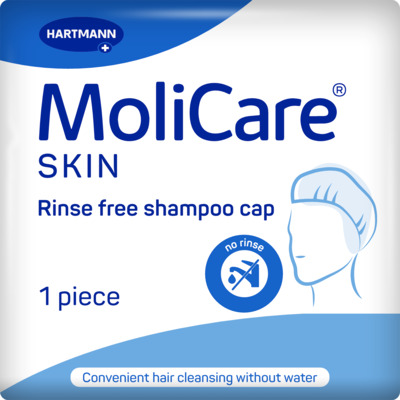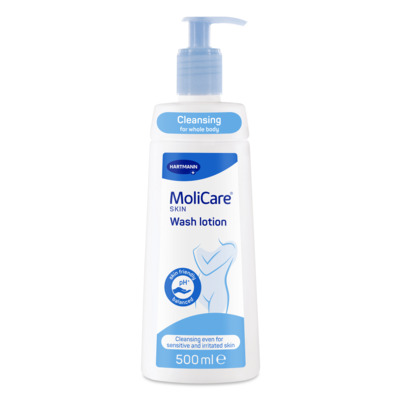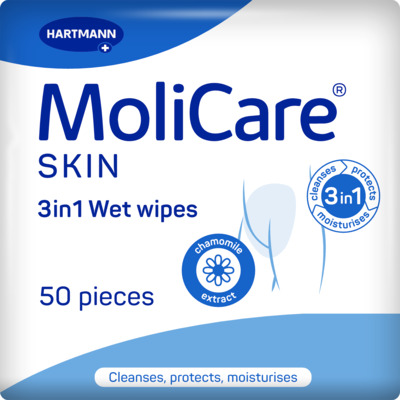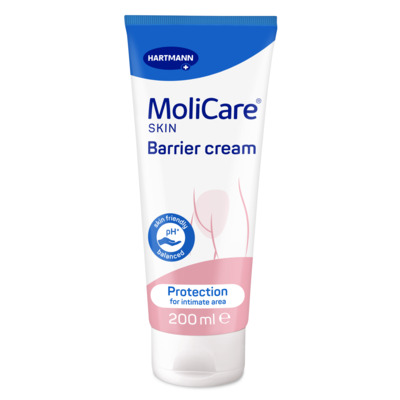Incontinence Advice
The Importance Of Skin Care and Incontinence
Living with incontinence presents many unique challenges, one of which is maintaining proper skin care. The impact of prolonged exposure to urine and faeces on the skin can lead to skin breakdown, irritation, and inflammation. In this article, we will explore the significance of good skin care when you have incontinence and provide practical tips for effective skin care. If you are looking for incontinence skin care products take a look at the MoliCare range of skin care products specifically designed for intimate skin cleansing of incontinent skin.

Understanding The Impact Of Incontinence On Skin Health
Incontinence can have detrimental effects on the skin due to prolonged exposure to urine and faeces. Moisture-related skin damage, irritation, and inflammation are common issues associated with the condition which can help to be prevented by using a barrier cream daily. Here are some skin conditions that can be caused by irritated skin due to incontinence:
● Incontinence-Associated Dermatitis (IAD)
● Nappy rash
● Urinary tract infections
● Fungal infections
● Pressure ulcers
● Moisture lesions
Studies have found that around one-third of people with incontinence develop dermatitis[1], which can quickly progress to more serious conditions if not addressed. People who have incontinence problems will often struggle to control their urine or bowel flow, and this can lead to the common skin problems listed above. The areas of the body that are most likely to be affected include the areas surrounding the buttocks, hips, genitals, and the perineum (the area between the pelvis and rectum). Because of this, excess moisture within these areas can lead to skin problems such as irritation, peeling, redness, and yeast infections. Bedsores can also develop if you:
● Have not eaten enough (malnourishment).
● Have received radiation therapy within the area.
● Spend most of the day in a wheelchair, normal chair, or confined to a bed without regularly changing position.
Urinary Incontinence Needs Good Skin Care
Your skin is the first line of defence against infections. However, when it becomes irritated by the presence of urine or stool, it can lead to skin damage, leaving you susceptible to bacterial and fungal infections. If you don’t maintain cleanliness and dryness, you can potentially develop Incontinence-Associated Dermatitis (IAD).
IAD occurs when your skin is in constant contact with urine or stool for an extended period. The acidic nature of urine disrupts the pH level of your skin, compromising its ability to maintain a healthy moisture barrier. As a result, your skin becomes more susceptible to sores and infections. Moreover, faeces contain enzymes from your digestive system that can damage your skin, further increasing your skin’s vulnerability to infections.
Approximately one-third of individuals experiencing incontinence develop dermatitis, a condition that can progress to more severe complications. However, by practising appropriate skin care, you can prevent this and ensure maximum comfort.
Many MoliCare skin products are enriched with out Nutriskin Protection Complex, a blend of vital ingredients like amino acids, sweet almond oil, essential unsaturated fatty acids, and creatine, fortifying the skin's natural barrier function.
Daily Skincare Guide for Incontinence
- Urinary Incontinence Needs Good Skin Care
- Understanding The Impact Of Incontinence On Skin Health
- The Role of Appropriate Skin Care
- Daily Skin Care for Incontinence
- Practical Tips For Incontinence Related Skin Care
- What To Do If Bed Ridden Or Physically Impaired
- How To Treat Incontinence Skin Breakdown
- Skin Care Advice for Caregivers Assisting Individuals with Incontinence
- Prioritise Skin Care When Managing Incontinence
- FAQs
The Role of Appropriate Skin Care
Implementing a consistent and appropriate skincare routine can help prevent or manage incontinence-related skin problems. Maintaining incontinence skin care cleanliness, pH balance, and dryness is crucial for promoting overall skin health and reducing the risk of infection. Regular cleansing, moisturising, and protective measures safeguard the skin from potential irritants and friction.
To ensure proper skin healthcare, it is crucial to have a good daily routine. These can be done by:
● Promptly cleaning and drying the area after emptying the bowels.
● Cleansing the skin with mild, diluted soap and water, thoroughly rinsing, and gently patting dry the area.
● Use a moist cleansing tissue such as MoliCare Skin Moist Skin Care Tissues to cleanse the area when you don’t have access to soap and water.
● Utilising soap-free skin cleansers such as MoliCare Skin Cleansing Foam that do not cause dryness or irritation, and do not require rinsing.
● Using moisturising creams can help maintain skin moisture. However, it is important to avoid products that contain alcohol, as these can lead to the irritation of the skin. If undergoing radiation therapy, we recommend that you consult a healthcare professional regarding using creams or lotions. Try MoliCare Skin Barrier Cream as a daily moisturising barrier to protect the skin.
The use of a barrier cream as part of your daily skin routine can be beneficial for maintaining skin when you have incontinence. Creams containing zinc oxide will also provide an additional anti-inflammatory effect.
Even when using these products, it is essential that you clean the skin thoroughly at regular intervals and each time you pass a stool. Barrier creams should be reapplied following the cleaning and drying process.

Daily Skin Care for Incontinence
Maintaining optimal skin care for those with incontinence involves a daily skincare routine consisting of three primary steps: cleansing, moisturising, and applying a barrier cream to provide additional protection against bladder and bowel leaks.
Cleansing: The first step in promoting skin care is to ensure cleanliness. Opt for cleansers that are free of soap and alcohol, as they won't dry out your skin. We advise cleaning your skin promptly after a bowel movement. No-rinse cleansing foams and wipes are excellent choices for effectively removing waste without excessively drying or irritating your skin.
Care: Using a barrier cream in your skincare routine is essential. Barrier creams are specifically designed to create a protective layer on the skin, acting as an additional moisture barrier, they will seal out moisture and safeguard the skin against wetness. Try a barrier cream specifically designed for intimate skin to enhance the skin’s own barrier function such as MoliCare Skin Barrier Cream which is the ideal companion for absorbent pads, pants and adult nappies and will not affect the absorbency of the pad.
Protect: If you experience any skin irritation, try a barrier cream which incorporates zinc oxide, an anti-inflammatory, that manages any rashes and sores. A reliable barrier cream should not easily rub off and can provide protection against chafing when wearing incontinence products.
In addition to your daily skincare routine, it is important to keep your skin dry by using incontinence underwear that effectively pulls moisture away from your body and locks it inside the pad. This way, you can avoid the discomfort of feeling wet even after experiencing a bladder leak.
Learn more about how to protect your skin if you have incontinence.
Practical Tips For Incontinence Related Skin Care
To ensure that you know how to appropriately apply the right skin care for those with incontinence, follow these tips:
- Choose
gentle cleansers: Opt for mild,
pH-balanced cleansers specifically formulated for sensitive skin. These
cleansers will effectively cleanse the skin without causing dryness or
irritation.
- Cleanse
the skin gently: When cleaning the
skin, use lukewarm water and apply a small amount of the chosen cleanser
to your hands. Gently massage the cleanser onto the skin in circular
motions, paying close attention to areas affected by urine or stool. Avoid
using rough or abrasive materials that could further irritate the skin.
- Rinse
thoroughly and pat dry: After
cleansing, rinse the skin thoroughly with lukewarm water to remove any
residue from the cleanser. Avoid
using hot water, as it can strip the skin of its natural oils. After rinsing, gently pat the skin dry with a soft
towel or cloth. It is important to avoid rubbing the skin, as this can
cause friction and irritation.
- Apply
a barrier cream: Once the skin is
clean and dry, apply a suitable barrier cream or ointment to protect the
skin from moisture and irritation. Look for products that contain
ingredients like zinc oxide to manage any skin irritation or incontinence-associated dermatitis. Apply the barrier cream evenly
to areas prone to moisture, such as the buttocks and genital area.
- Choose
products with a 3-layer absorbent core:
Choose purpose-designed incontinence underwear or absorbent pads that are
specifically designed to pull moisture away from the skin and lock it
inside. These products help to keep the skin dry and reduce the risk of
prolonged exposure to moisture, which can lead to skin damage and
irritation.
- Regularly
change incontinence products: It is
important to change incontinence products regularly and as soon as
possible after a bowel movement. Prolonged exposure to urine or stool can
increase the risk of skin irritation and infection.
- Consider
using moisturisers: In addition to
barrier creams, using a moisturiser can help keep the skin hydrated and
supple. Choose products that are specifically designed for intimate skin.
- Monitor and address any skin changes: Regularly inspect your skin for any signs of redness, irritation, or skin breakdown.
What To Do If Bed Ridden Or Physically Impaired
If you are confined to a bed or are physically impaired e.g., wheelchair, there are alternative methods to ensure good skin care if you have incontinence. For example, you can regularly check the skin for pressure sores. Additionally, check reddened areas that do not turn white when pressed or if pressure is applied to it. You should also check for signs of blisters, sores, and open ulcers.
Maintaining a healthy, well-balanced diet will assist in giving the body enough nutrients to help keep skin healthy. This will also help in maintaining good hygiene for someone that you care for.
For those who must stay in bed:
If you must remain in bed, try these tips:
● Regularly change your position, at least after every 2 hours.
● Change bedsheets and clothing right away if there has been a leakage.
● Use items that will help reduce pressure on the body, including pillows and foam padding.
For people in a wheelchair:
● Make sure the wheelchair has been securely fitted.
● Shift body weight every 15-20 mins.
● Use comfortable items to reduce pressure, such as pillows.

How To Treat Incontinence Skin Breakdown
Even with a good skincare routine, occasional rashes and skin breakdowns may still happen. When faced with incontinence-associated dermatitis, the first priority is to prevent making it worse. This entails checking the absorbency of the product, correct sizing, and fitting, using barrier creams, and keeping skin dry and clean. Here are some suggestions for treating dermatitis or skin sores:
Choosing well-fitting underwear: Dermatitis and sores frequently emerge due to friction and chafing caused by ill-fitting underwear around the leg openings or in between the legs. If you notice bunching or chafing, this indicates that your current underwear is not suitable. Experiment with different sizes until you find one that doesn't rub against your skin.
Promptly change underwear after a bowel movement: Prolonged skin exposure to faecal matter intensifies the breakdown process as acidic substances and enzymes continue to erode the skin.
Apply healing salves: Once you have thoroughly cleansed and dried the affected area, administer a medicated salve (skin cleanse tissues) to alleviate discomfort and shield the damaged skin during the healing process.
Use a barrier cream: Once you have thoroughly cleaned and dried the affected area, use a barrier cream to alleviate discomfort and shield the damaged skin during the healing process.
While these measures can effectively reduce or reverse the early stages of IAD, it is vital to consult your GP if persistent skin irritation persists or if the development of sores occurs. Early medical attention is necessary, as the condition can easily progress to a more severe and challenging-to-treat state.
Skin Care Advice for Caregivers Assisting Individuals with Incontinence
As a caregiver for someone experiencing incontinence, you can play a crucial role in supporting their skin care. Ensure that they have the necessary products and regularly check on their skin condition. In cases where the individual has limited mobility or cognitive disorders, you may also need to assist with cleaning and changing their underwear. Remember to prioritise the use of mild, soap-free cleansers when tending to them between accidents.
When venturing outside, be prepared for potential accidents by carrying cleansing supplies and extra incontinence underwear. It can also be helpful to have disposal bags on hand, allowing for discreet disposal of used products.
Keep in mind that individuals may feel embarrassed or ashamed about their incontinence, leading them to not mention accidents or be hesitant to ask for assistance. Incontinence is a common medical condition and, therefore, you should approach the matter with sensitivity, by making the interaction less embarrassing for the person you are caring for. For further advice, we have a great guide on top tips for managing incontinence.
Prioritise Skin Care When Managing Incontinence
Appropriate skin care is of utmost importance for those with incontinence to prevent potential complications and maintain comfort and well-being. By prioritising good skin hygiene and adopting the recommended practices, individuals with incontinence can enhance their quality of life and minimise the risks associated with skin breakdown.
FAQs
Why is appropriate
skin care important for individuals with incontinence?
Appropriate skin care is essential for individuals with incontinence because prolonged exposure to urine and faeces can lead to skin damage, irritation, and infection. Maintaining good skin hygiene helps prevent skin issues such as incontinence associated infections, diaper rash, urinary tract infections, fungal infections, and pressure ulcers.
What are the key
factors of a skin care routine for incontinence?
A skin care routine for incontinence typically involves gentle cleansing with mild, pH-balanced cleansers, thorough drying (avoid rubbing), and the application of a barrier cream to protect the skin. These steps help maintain skin cleanliness, pH balance, and dryness, reducing the risk of irritation and infection.
What types of
products should I use for skin care when I have incontinence?
Use fragrance-free, hypoallergenic cleansers, moisturisers, and barrier creams or ointments specifically designed for intimate skin. These products are less likely to cause irritation and are more suitable for individuals with incontinence.
How often should I
cleanse my skin when I have incontinence?
It is important to cleanse the skin regularly and after each bowel movement or as soon as possible to minimise the exposure of the skin to faeces. Regular cleansing helps remove potential irritants and maintain skin hygiene.
Are there any
additional measures I can take to protect my skin?
Yes, in addition to cleansing, it is recommended to keep the skin dry and minimise prolonged exposure to moisture. Using 3-layer absorbent core absorbent pads can help keep the skin dry.
What should I do if I
notice skin irritation or breakdown?
If you notice any signs of skin irritation or breakdown, it is important to seek medical advice. Contact a healthcare professional, or your GP, who can assess the condition and provide appropriate treatment recommendations.
Can a healthy diet
and lifestyle help maintain good skin health when dealing with incontinence?
A balanced diet, proper hydration, and a healthy lifestyle can contribute to overall skin health. Drinking enough water helps maintain skin hydration, while a nutrient-rich diet supports skin resilience. Additionally, avoiding excessive caffeine and alcohol intake can help minimise potential irritants to the skin.
Source
[1] Gray M, Bliss DZ, Doughty DB, Ermer‐Seltun J,
Kennedy‐Evans KL, Palmer MH. Incontinence‐associated dermatitis: a consensus. J
Wound Ostomy Continence Nurs. 2007; 34: 45–54. doi:
10.1097/00152192-200701000-00008. PMID: 17228207. Available at: https://pubmed.ncbi.nlm.nih.gov/17228207/
[accessed 09/06/2023]

MoliCare Skin Rinse free shampoo cap
<p>MoliCare® Skin is a complete cleanse, protect and care solution for skin stressed by incontinence and compromised skin. </p> <p><a href="https://www.youtube.com/watch?v=MZgu3L0_Yj4">Watch our video on how to use this product</a></p>
MoliCare® Skin Wash Lotion
<p>Used as a gentle alternative to your usual shower gel or soap, MoliCare® Skin Wash Lotion is a nourishing cleanser that is gentle enough for use on the most delicate skin. With nourishing almond oil and panthenol, this wash lotion cleanses and moisturises, use as part of your daily MoliCare skin cleanse, care and protect routine.</p> <p>With its integrated dispenser pump that’s quick and easy to use, even one-handed, MoliCare® Skin Wash Lotion effectively cleans even irritated or incontinence compromised skin and delicate areas. Dermatologically tested and with its pleasant fragrance plus odour neutralising, this cleanser will leave your skin feeling refreshed, and you feeling clean and confident.</p> <p>• Contains nourishing almond oil and panthenol<br /> • Easy to use pump dispenser for one-handed application<br /> • Refreshing fragrance and odour neutralising<br /> • Dermatologically tested<br /> • Gentle enough to be used on irritated or incontinence-compromised skin</p> <p>Our easy online ordering means you never have to worry about running out of your MoliCare® Skin Wash Lotion. With quick delivery direct to your door, we also offer free delivery on all orders over £50.</p> <p>Need more help? Our customer service team are on hand to answer all your queries – call us today on 0800 028 9470</p>
MoliCare Skin 3in1 Wet wipes
<p>MoliCare® Skin is a complete cleanse, protect and care solution for skin stressed by incontinence and compromised skin.</p>
